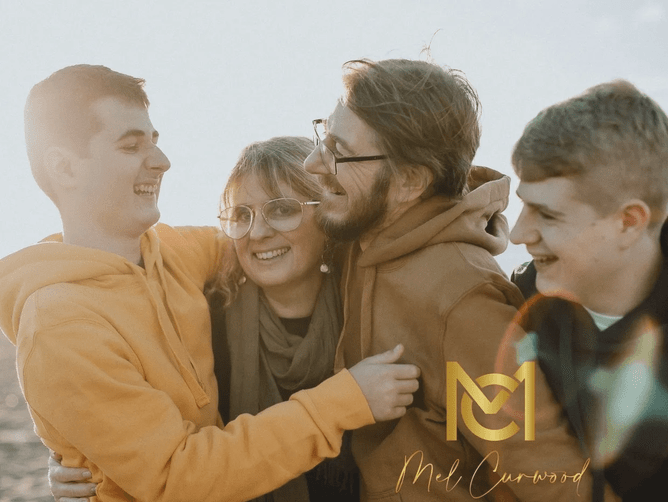Business mentor Mel Curwood shares how she coped when life as she knew it spun upside down.
Mel Curwood recently came across an online post of a billboard outside a café which read ‘Go home 2023, you’re drunk’ – a fitting phrase that pretty much summed up what many of us had been feeling as 2023 unfolded and one Mel relates to.
Her world came crashing down when her husband of 23 years, John Curwood, was diagnosed with bowel cancer.
The couple, who have sons Seth, 22, and Liam, 16, met as students at Te Aroha College in 1995 and have been together ever since.
Suddenly, the things that once seemed important faded into the background, and they were faced with a new reality.
“When they told us what they found, everything else ceased to exist,” Mel shares.
“John and I have shared everything in life – we grew up together and he is the love of my life. John is my champion, best friend, and biggest supporter.
We have an incredible life together as a family and as a couple. I wouldn’t be where I am in business or in life without his constant support and belief in me,” she says.
“Everything started spiralling out of control and then it turned to thoughts of ‘I’ve got work, he can’t work, I can’t fathom speaking to anybody.’ And, if I didn’t have the capacity to speak to anybody – which was the biggest part of my role – how were we going to pay for things?”
Being a business owner, Mel felt the weight of responsibility over her team, her clients, her family, and her family’s financial stability.
Mel’s experience is not uncommon, and it’s something that many women who are juggling business and family responsibilities can relate to. Even though she and her husband shared the load equally, she says there is a different layer of responsibility when you’re a mum, especially when unforeseen events get thrown into the mix.
“I take my hat off to mums in business who are trying to do it all. I’ve seen this with many of my clients over the years as there’s been many different events that have left many of them reaching crisis point,” she says.
While everyone would prefer to not be in those situations, Mel says she has both seen and experienced people coming together for each other in times of need. “It’s a cliché, but these things really do show us what’s important. We’re all guilty of getting caught up in the day-to-day on autopilot. But when your reality has a dichotomy shift, it shapes your perspective. It takes you to places emotionally that you never knew – like heartache and overwhelming sadness. But it also takes you to places of love and compassion,” Mel explains.
When the unforeseen happens, like John’s lifechanging diagnosis or natural disasters, Mel says it’s easy to feel isolated and out of control. In fact, after receiving John’s diagnosis, she tried coping by making herself busy and going into overdrive in an attempt to gain back what little control she had left.
“I remember going to the doctor and they were taking my blood pressure because they were worried about me as well. The doctor took it three times and eventually said, “You need to calm down,” and I just said, “This is as calm as I get.”
Mel admits she experienced some dark times, and recalls a moment lying on her bed, feeling like she was being sucked into a black hole. She didn’t know how she was going to continue to exist.
“It was a feeling I’ve never had before, and it was immensely scary. What it showed to me was how important it is to talk to people, and to have an action plan.
“Part of being alive is dying – sooner or later, you’re going to be separated from someone you love, whether it’s in your 40s or 90s. You have to come to peace with that worst case scenario and put plans in place and be able to talk to others about death and dying. There are a lot of other cultures that talk about death a lot better than we do. Once you’ve got a plan, your brain subconsciously goes ‘Right, that’s on the ‘sorted’ shelf’.”
After John’s diagnosis, his life and health insurance kicked in, and income protection insurance, which meant the mortgage could still be paid and John could take extended paid leave.
“Our 15-year-old said we’re the luckiest unlucky people. We really are, because we’ve had the resources, the financial stability, and the friendships to help guide us through, and we know that we’ve been in a privileged situation. There are people that have been through what we’ve been through that didn’t have the money to rely on,”
says Mel. “It seems to be that the world keeps delivering to all of us, things that we couldn’t foresee.”
How do we find our anchor point amongst chaos and instability? Mel believes part of the answer is being kinder to each other and ourselves.
“As someone in business, I understand that we’re all trying to make our mark on the world. We want to be seen as strong and capable of amazing things, like we’ve got our shit together, but I want people to know that we can simultaneously be strong and inspiring, but also vulnerable and in need of help sometimes.
“There is goodness that can come out of hard times. It’s okay to not be okay, it’s okay to be sad, and it’s okay to be scared, but having people around you and plans in place can make a big difference. It can be beautiful when you open your heart and soul to talk to others about what’s really going on.”
Leading from the front
In her role as a cashflow protection specialist, Mel Curwood works closely with business owners supporting them at times when things are incredibly challenging – not only for their businesses but also as families and people.
Why did you decide to share your personal story?
Mel: I have really wonderful and privileged relationships with my clients and as my family and I stepped out into this journey and began to find our feet in this ‘new reality’ of finding wellness again after a cancer diagnosis, I began working again with my clients. What I found was that as I shared my story and what we were experiencing, it created a safe space for others to share their story and what they were going through.
Business owners, when faced with crisis in their lives, have to find their feet and have to figure out a way to be strong enough to carry on in their businesses. They have made the choice to own their own time but with it comes a responsibility to their staff and their customers to figure out how to keep going.
I also feel that if we can get more comfortable in talking about our own mortality, then the less fearful of loss we might become.
What in your tool kit has helped you through this period of time?
Mel: Family support, a broad network of community and friends, a desire to control what we could when everything else felt out of our control, and an ability to speak openly and honestly about what we were experiencing.
We have remained focused on the vision of our future that we had carved out for ourselves. We’ve continued to renovate our house, to travel, to build towards our long-term dreams and aspirations – to remain positively focused, to live in the now and not in the fear of what could go wrong in the future, to take the focus away from what our challenges are and to add value to others around us.
By Good Magazine
https://goodmagazine.co.nz/finding-good-after-crisis-and-how-to-carry-on/

